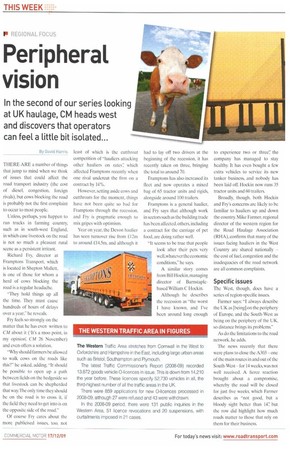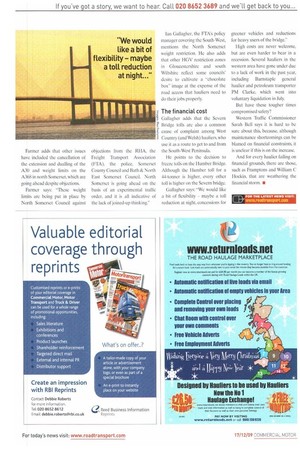P REGIONAL FOClic
Page 14

Page 15

If you've noticed an error in this article please click here to report it so we can fix it.
Peripheral vision
In the second of our series looking at UK haulage, CM heads west and discovers that operators can feel a little bit isolated...
By David Harris
THERE ARE a number of things that jump to mind when we think of issues that could affect the road transport industry (the cost of diesel, congestion, foreign rivals), but cows blocking the road is probably not the first complaint to occur to most people.
Unless, perhaps, you happen to run trucks in farming country, such as in south-west England, in which case livestock on the road is not so much a pleasant rural scene as a persistent irritant.
Richard Fry, director at Framptons Transport. which is located in Shepton Mallett, is one of those for whom a herd of cows blocking the road is a regular headache.
-They hold things up all the time. They must cause hundreds of hours of delays over a year," he reveals.
Fry feels so strongly on the matter that he has even written to CM about it (It's a moo point, in my opinion', CM 26 November) and even offers a solution.
"Why should farmers he allowed to walk cows on the roads like this?" he asked, adding, "It should be possible to open up a path between fields on the hedgeside so that livestock can be shepherded that way The only time they should be on the road is to cross it, if the field they need to get into is on the opposite side of the road."
Of course Fry cares about the more publicised issues, too, not least of which is the cutthroat competition of "hauliers attacking other hauliers on rates': which affected Framptons recently when one rival undercut the firm on a contract by 14%.
However, setting aside cows and cutthroats for the moment, things have not been quite so bad for Framptons through the recession. and Fry is pragmatic enough to mix gripes with optimism.
Year on year, the Devon haulier has seen turnover rise from £12m to around £14.5m, and although it had to lay off two drivers at the beginning of the recession, it has recently taken on three, bringing the total to around 70.
Framptons has also increased its fleet and now operates a mixed bag of 65 tractor units and rigids, alongside around 100 trailers.
Framptons is a general haulier, and Fry says that although work in sectors such as the building trade has been affected, others, including a contract for the carriage of pet food, are doing rather well.
"It seems to be true that people look after their pets very well,whatever the economic conditions," he says.
A similar story comes from Bill Hockin,managing director of Barnstaplebased William C Hockin.
Although he describes the recession as "the worst I have known, and I've been around long enough to experience two or three': the company has managed to stay healthy. It has even bought a few extra vehicles to service its new tanker business, and nobody has been laid off. Hockin now runs 35 tractor units and 60 trailers.
Broadly, though, both Hockin and Fry's concerns are likely to be familiar to hauliers up and down the country. Mike Farmer, regional director of the western region for the Road Haulage Association (RHA), confirms that many of the issues facing hauliers in the West Country are shared nationally — the cost of fuel, congestion and the inadequacies of the road network are all common complaints.
Specific issues
The West, though, does have a series of region-specific issues.
Farmer says: "I always describe the UK as [being] on the periphery of Europe, and the South-West as being on the periphery of the UR, so distance brings its problems."
As do the limitations to the road network, he adds.
The news recently that there were plans to close the A303 — one of the main routes in and out of the South-West — for 14 weeks, was not well received. A fierce reaction brought about a compromise, whereby the road will be closed for just five weeks, which Farmer describes as "not good, but a bloody sight better than 147 but the row did highlight how much roads matter to those that rely on them for their business. Farmer adds that other issues have included the cancellation of the extension and dualling of the A30 and weight limits on the A3oS in north Somerset, which are going ahead despite objections. Farmer says: "These weight limits are being put in place by North Somerset Council against
objections from Freight Transport Association (FTA), the police. Somerset County Council and Bath Sz. North East Somerset Council. North Somerset is going ahead on the basis of an experimental traffic order, and it is all indicative of the lack of joined-up thinking."
the RHA, the Ian Gallagher, the FTA's policy manager covering the South-West, mentions the North Somerset weight restriction. He also adds that other HGV restriction zones in Gloucestershire and south Wiltshire reflect some councils' desire to cultivate a "chocolate box" image at the expense of the road access that hauliers need to do their jobs properly.
E The financial cost _
q, Gallagher adds that the Severn Bridge tolls are also a common F., cause of complaint among West Country (and Welsh) hauliers, who use it as a route to get to and from the South-West Peninsula.
He points to the decision to freeze tolls on the Humber Bridge. Although the Humber toll for a 44-tonner is higher, every other toll is higher on the Severn bridge.
Gallagher says: "We would like a bit of flexibility — maybe a toll reduction at night, concessions for
greener vehicles and reductions for heavy users of the bridge.
High costs are never welcome, but are even harder to hear in a recession. Several hauliers in the western area have gone under due to a lack of work in the past year, including Barnstaple general haulier and petroleum transporter PM Clarke, which went into voluntary liquidation in July.
But have these tougher times compromised safety?
Western Traffic Commissioner Sarah Bell says it is hard to be sure about this, because, although maintenance shortcomings can be blamed on financial constraints, it is unclear if this is on the increase.
And for every haulier failing on financial grounds, there are those, such as Framptons and William C Hockin, that are weathering the financial storm. •
























































































































































